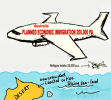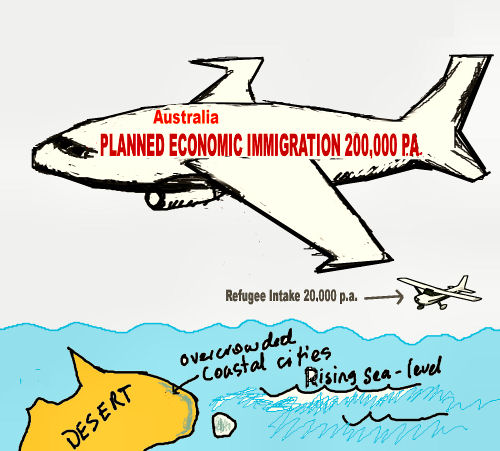New wave of asylum seekers could be coming our way
As the nation panics over a small number of asylum seekers, we're left to wonder how Australia will respond to the millions of anticipated "climate change” asylum seekers? How are we to respond?
According to the Australian Greens, Australian society, culture and the economy has benefited, and will continue to benefit, from immigration of people from around the world. We won't continue to benefit if immigration continues to drive our population growth beyond sustainable limits. The environment, and ecological forces, and Nature's devastating powers transcend humanitarian concerns and economic requirements of an economy that needs to be fed by constant growth. We still haven't, despite advances in science and technology, solved the limitations of nature, and we still can't harness extreme weather or reign in natural disasters.
The Australian Greens are being inconsistent with their environmental and climate change policies by supporting limitless population growth.
Australia's fragile food security
The Chief Scientist's report to PMSEIC (Prime Minister’s Science, Engineering and Innovation Council Oct 2010) on food security, reported that we currently feed nearly 40 million people on top of our own 22.5 million. If our population grows to 35–40 million as planned, and climate change reduces food production, we can expect to see years where we will import more food than we export.
We can no longer rely on increased water, land and energy use to drive the transformation of food production systems.
The PMSEIC report suggests increased challenges to the important food exporting industry including land degradation, population growth, long-term climate change, competition for arable land in peri-urban areas, scarcity of water, nutrient and energy availability.
With the high level of foreign investment in agricultural production much of our food production is committed to overseas consumption. There are now a large number of properties owned by middle eastern companies using them as feed lots to prepare animals for the live stock export trade. WA is responsible for 50% of live animal exports. There is also feedlot livestock for export to Indonesia and the USA.
In 2008, following prolonged drought, our wheat exports dropped to nearly match the level of our domestic consumption. Wild fish catches are declining in Australian waters and productivity in the agricultural sector declining.
Status of Refugees – at present
According to the United Nations Convention and Protocol relating to the Status of Refugees (the Refugee Convention), a refugee is someone who is outside their own country and cannot return due to a well-founded fear of persecution because of their: This definition does not at present include those fleeing from climate change, overpopulation or natural disasters.
From the Australian Human Rights Commission webpage:
Governments have traditionally approached climate change as an ecological problem, or more recently, as an economic one. So far, the social and human rights implications of climate change have not been widely recognised .....As a signatory to the major international human rights instruments, Australia has an obligation to protect people against the threat that climate change poses to human rights. But the challenge is to develop a response to climate change that distributes rights and responsibilities equally.
...a human rights-based approach to policy development could, and should, be adopted to provide a standard for evaluating policy and resource allocation.
Under the 1951 Refugee Convention, a refugee is a person with a well-founded fear of being persecuted for reasons of race, religion, nationality, membership of a particular social group or political opinion. Environmental and climate change factors are largely irrelevant. Will it be changed?
Surely there needs to be a lot more emphasis and policies, on "responsibilities" , not just rights. There is a lot of talk and words related to "sustainability" and mitigating climate change, but little is being done in real terms, especially in Australia.
The Hon Tony Burke MP is Minister for Sustainability, Environment, Water, Population and Communities. He is not a minister for Sustainable Population any more! There is a lot of use of the word “sustainable” but little action.
Australian Greens – “No human being is illegal”
The Australian Greens want an immigration program that is predominantly based on family reunions and other special humanitarian criteria as defined by international human rights Conventions. They want migrants to be given access to a full range of culturally sensitive, appropriate health services including a comprehensive medical examination on arrival.
"No human being is illegal"
They are also lobbying for the planning for climate change refugees with a particular focus on the Asia-Pacific region.
It is vital that Australia needs to develop a considered, long-term approach to asylum seekers and refugees because many of them could be heading our way.
Australian Greens Deputy Leader Senator Christine Milne thinks so. Australia is historically one of the biggest contributors to the climate crisis. Whether we are legally obliged to or not, we certainly have a moral obligation to help those who climate change will hurt or displace. However, we are not responsible for their over population, their unsustainable environmental use, or their cultures that encourage fertility.
Environmental refugees set to increase six-fold
Norman Myers of Oxford University has estimated climate change will increase the number of environmental refugees six-fold over the next fifty years - to 150 million.
Australian climate scientist Dr. Graeme Pearman, has predicted that a 2°C rise in temperature would place 100 million people “directly at risk from coastal flooding” by 2100.
Asia Pacific region
Most of the 22 nations in the Pacific are low-lying atolls, with limited land space, small populations and little financial resources. More than 50% of Pacific Islander people live within 1.5 kilometres of the shore. They are all under threat of natural disaster and rising sea levels.
The Asia Pacific region is home to over 60% of the world's people, of which according to the United Nations two-thirds of whom live in extreme poverty. With such large proportion of the current population living in poverty, climate variability already has a significant impact on the health and livelihoods of people across Asia.
Climate change will exacerbate natural disasters, health problems and threats to water and food security. It will undoubtedly affect the lives of those who are without social and economic resources to adapt to the changes in climate.
At the Copenhagen Conference in December 2009, the UN High Commissioner for Refugees (UNHCR), António Guterres- G-Magazine report , predicted that climate change will become the biggest driver of population displacements within the not too distant future. The numbers we're talking about are astronomical. His agency predicts between 50 and 200 million people to have moved by 2050.
A report suggests billions of people will starve by the year 2050 - ABC online , unless farm productivity lifts around the world.
Food production must be lifted or many people could go hungry, and there is a lot of pressure on food industries and farmers to increase their efficiency and output. Australian food security expert Professor Peter Langridge has similar views. However, there are limits to what Nature can continue to provide.
Listen to the MP3
Norman Borlaug – the father of the “green revolution”
Norman Borlaug was awarded the Nobel Prize in 1970 for his "green revolution" that revolutionised food security for millions of people and for many nations. In his acceptance speech, he warned the world in the clearest terms that his breakthrough had not tamed what he termed the "Population Monster". He merely bought us about 40 years respite in which to do something about it.
"Big Australia"
With bipartisan support for a "big Australia" and ongoing economic immigration, there seems to be little empirical or pragmatic difference between the Australian Green's altruistic and moral justification for population growth, and the demands of our capitalistic economic growth argument.
Is it because Australia’s political elite, including the Australian Greens, can no longer say ‘NO’ to immigration or accepting asylum seekers? Our sovereignty is not being given due respect, or being sufficiently honoured.
Our first priorities should be to the Australian voters, citizens, our descendants, and any obligations to help other nations should be primarily through aid, crisis assistance, providing skills ( not poaching them!), health and family planning advice, training towards permaculture farming.
 On Monday 31 March 2014, I watched the last half of Q and A, entitled "Human Rights and Wrongs." I was very annoyed by the hugely innaccurate information the panellists were operating with, which went uncountered by Tony Jones.
On Monday 31 March 2014, I watched the last half of Q and A, entitled "Human Rights and Wrongs." I was very annoyed by the hugely innaccurate information the panellists were operating with, which went uncountered by Tony Jones.

 Bill Shorten’s simplistic statement on immigration population and refugees in Tuesday night’s ALP leadership debate was also open ended and "cornucopian", ignoring the important issues directly affected by high population growth: environment , quality of life , employment, resources and future sustainability. Is Bill Shorten unaware of the sequelae of continuing rapid population growth or is he ignoring them?
Bill Shorten’s simplistic statement on immigration population and refugees in Tuesday night’s ALP leadership debate was also open ended and "cornucopian", ignoring the important issues directly affected by high population growth: environment , quality of life , employment, resources and future sustainability. Is Bill Shorten unaware of the sequelae of continuing rapid population growth or is he ignoring them? Further to this, Shorten either deliberately or naively melded the issues of Australia’s immigration program with the issue of refugees, seen by most of Australia, it seems as “boat people” thanks to the mainstream media who make it seem so. This is what Shorten said:
Further to this, Shorten either deliberately or naively melded the issues of Australia’s immigration program with the issue of refugees, seen by most of Australia, it seems as “boat people” thanks to the mainstream media who make it seem so. This is what Shorten said:
Recent comments